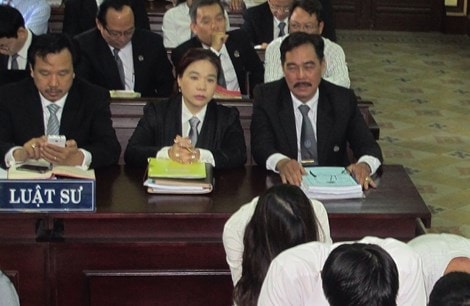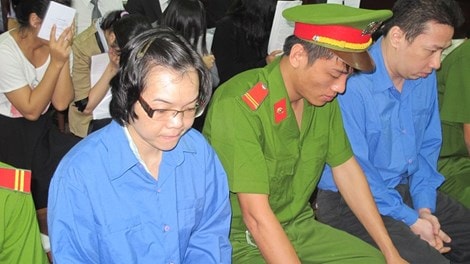Should a law be split in half?
On the afternoon of December 29, the debate of the appeal hearing of Huynh Thi Huyen Nhu and her accomplices who embezzled 4,000 billion VND entered a tense phase when the two units ACB and NaviBank refuted the opinions of VietinBank's lawyer, Huyen Nhu's lawyer and the prosecutor.
| RELATED NEWS |
|---|
ACB lost money, whose fault is it?
ACB's lawyer said that the People's Procuracy and Vietinbank's lawyers have not yet determined who is at fault in Huyen Nhu's act of appropriating nearly 719 billion VND from ACB.
According to this lawyer, the People's Procuracy and VietinBank's lawyers deliberately ignored the analysis to see the truth that the accounts of 17 ACB employees were opened legally, in accordance with the procedures and were also approved by VietinBank's leaders exactly the same as the other five companies. In fact, these 17 legal accounts were used for ACB employees to transfer money from 32 contracts into these accounts.
 |
| The lawyer said that the People's Procuracy and Vietinbank's lawyers have not yet determined who is at fault in Huyen Nhu's act of appropriating ACB's money. |
The lawyer raised the question: "If the People's Procuracy appeals, the lawyers defending Huyen Nhu and the lawyers of VietinBank argue that: Huyen Nhu only raised capital on behalf of VietinBank. Huyen Nhu did not raise capital for VietinBank? So what do the People's Procuracy and the lawyers say about the evidence of Huyen Nhu's statements in the case file?"
From here, the lawyer quoted Huyen Nhu's testimony. Accordingly, the amount of 668.908 billion VND that Huyen Nhu mobilized from ACB employees to deposit into Vietinbank was mobilized by VietinBank through real money deposit contracts. At first, Huyen Nhu had no intention of appropriating, but only later, around August and September 2011, did Huyen Nhu commit the act of appropriation.
"After VietinBank receives the money transferred into the account, this money has become the property of Vietinbank, so whoever appropriates the money will be appropriating money owned by Vietinbank, managed by Vietinbank" - the lawyer emphasized.
The lawyer stated that it is impossible to say that ACB and its employees were at fault in transferring money to VietinBank, so Huyen Nhu's actions were not embezzlement.
Those who were “at fault” in transferring money to VietinBank were prosecuted in another case, but that does not mean that the act of appropriating nearly 718 billion VND is not an act of embezzlement.
It is impossible to argue: “ACB itself committed an illegal act and therefore will not be protected by the law”. Because if it is said that ACB committed an illegal act and is not protected by the law, why did the Court of First Instance force Huyen Nhu to pay compensation?
NaviBank refutes VietinBank and prosecutors
NaviBank's lawyer, in the same situation as ACB, also pointed out 10 unreasonable arguments of VietinBank. Notably, the lawyer emphasized "please do not argue": the deposit in the customer's payment deposit account is the customer's business, Vietinbank is not responsible for the loss of that amount of money, even though the customer is not at fault in the hundreds of billions of VND suddenly disappearing. Because that means Vietinbank is no longer a bank because it does not meet the minimum standards for a commercial bank.
 |
| Defendant Huyen Nhu in court |
NaviBank also said that the prosecution at the appeal hearing also had contradictory and paradoxical conclusions. First, when analyzing the legal and valid transactions of the 5 companies and the responsibility of VietinBank for customer deposits: Nothing is more accurate, reasonable, legal, complete, and rigorous than the arguments of the prosecutor. But those things contradict and overturn everything with the deposits of the 4 Navibank employees. It is even so absurd that Vietinbank did not have to pay compensation, but was "given" an additional 1.8 billion VND, but the prosecutor still did not respond.
The second contradiction is that the Procuracy agreed with the lawyers' opinions on the 5 mistakes of the First Instance Judgment against Navibank (mistakes in the legal status of Navibank; mistakes in the deposit of 4 Navibank employees; mistakes in the cause leading to the misappropriation of deposits; mistakes in the responsibility to return deposits to 4 Navibank employees; some other mistakes related to Navibank's rights....). The particularly serious issues related to both crime and civil liability that the Appeal Judgment could not correct were very contradictory when the Procuracy only determined that they were serious for the 5 companies and had no meaning for Navibank.
"If we follow the opinion of the Court of Appeal, the upcoming judgment is at risk of having to accept the paradox of splitting the top and bottom of an incident, splitting a group of victims, splitting a truth, splitting the nature of a problem, splitting a law, to create two completely opposite judgments," the lawyer emphasized.
According to PLO






